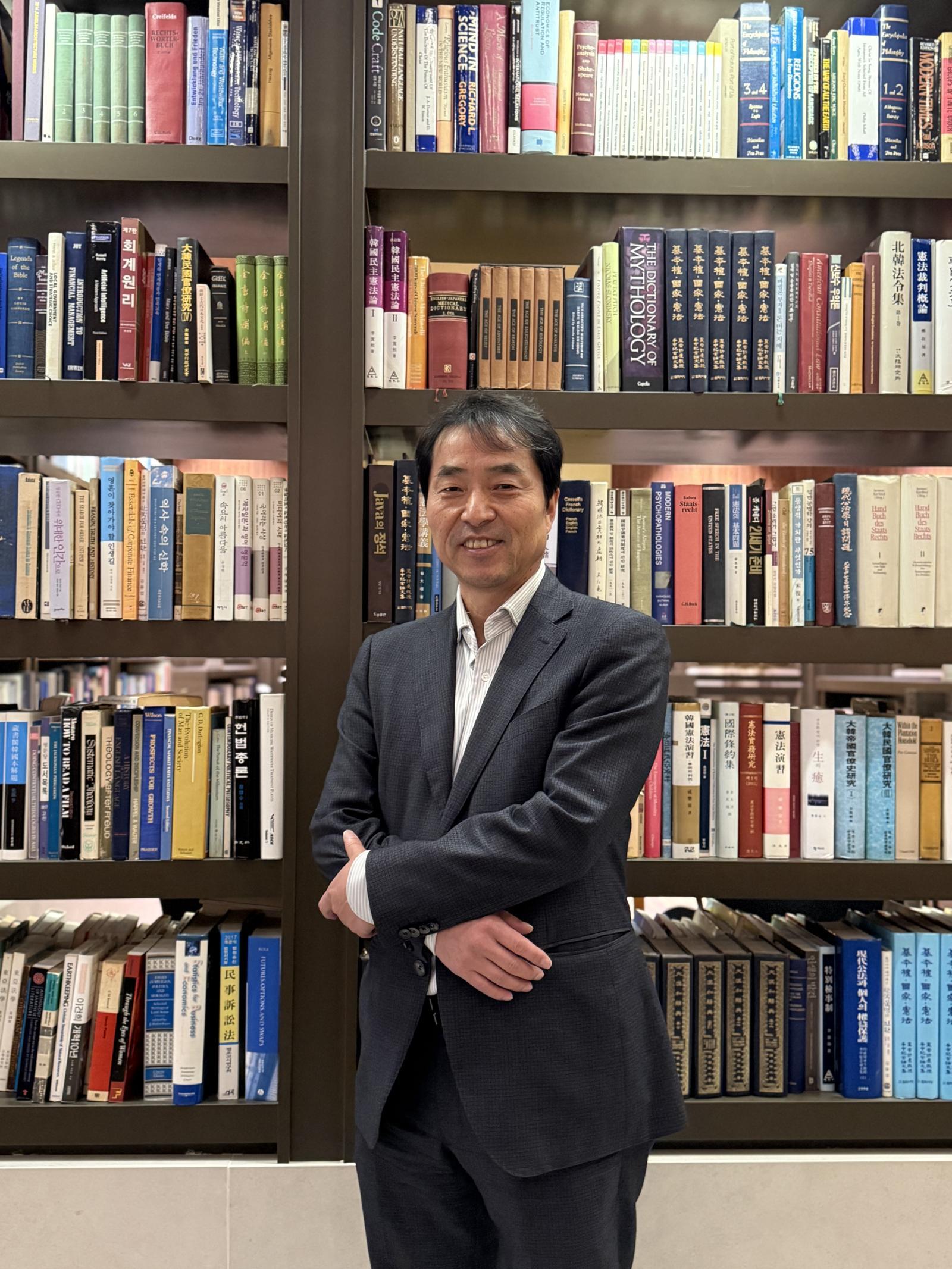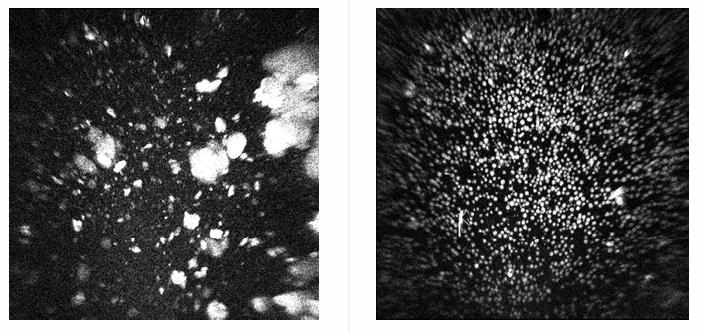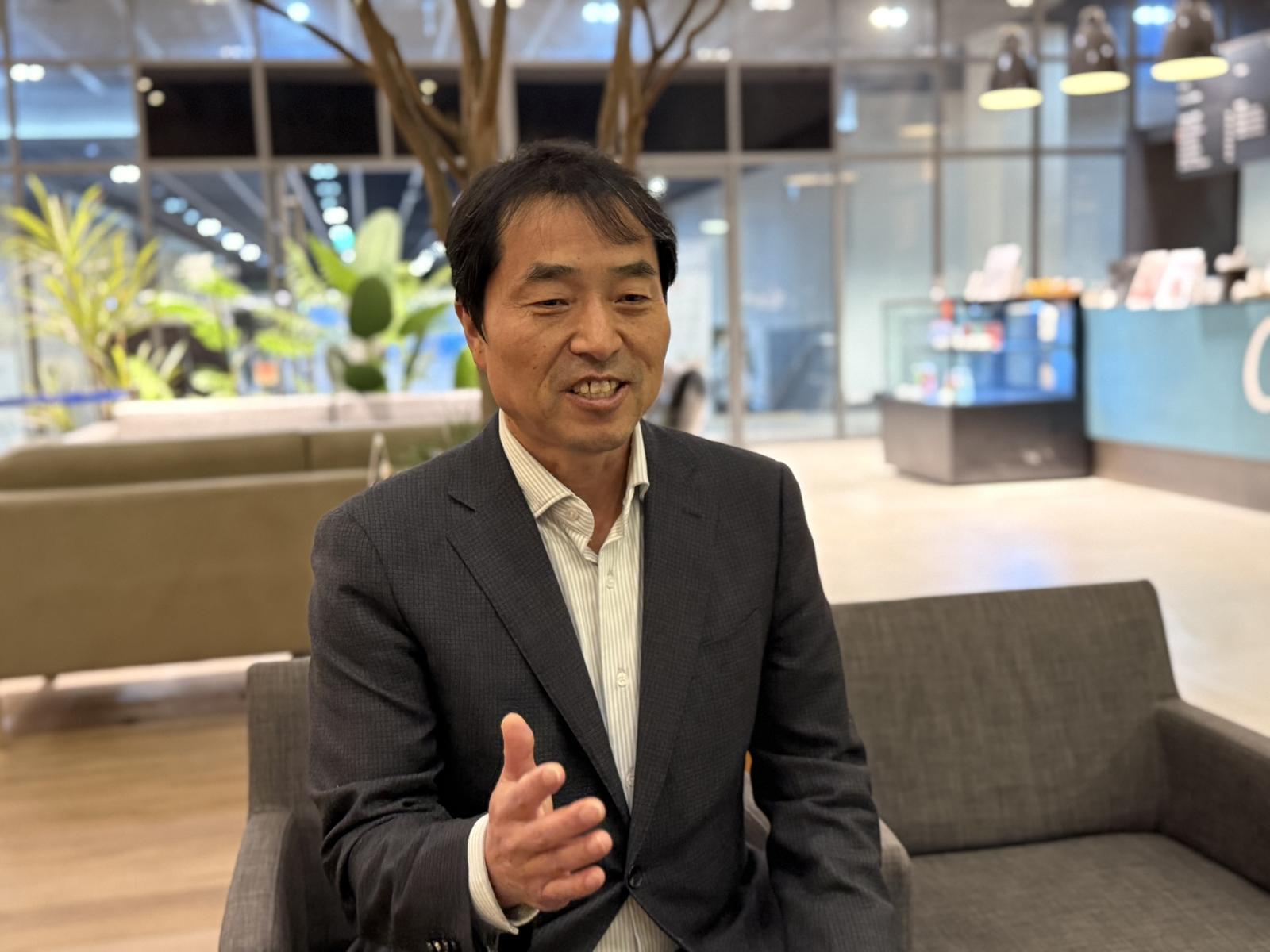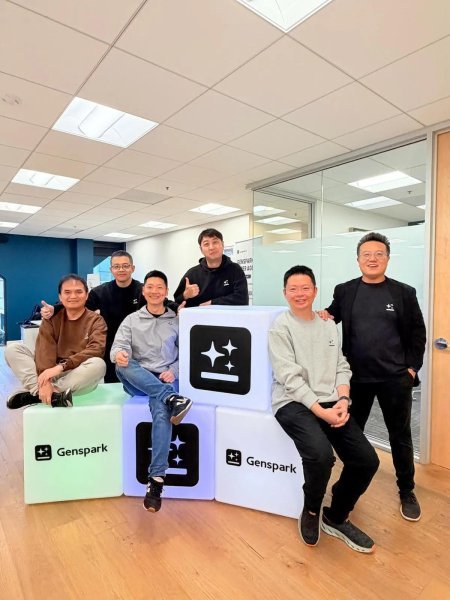
Startup / Drug Development
"Space Drug Development Costs 20% of Earth's"
Dong-A Ilbo |
Updated 2025.11.10
Yoon Hak-soon, CEO of Space Lyntech, is conducting an interview with Dong-A Ilbo at Yonsei University campus in Seodaemun-gu, Seoul, on the 7th. Provided by Space Lyntech
Journalists from Dong-A Ilbo's IT Science Team introduce notable technologies, trends, and companies in the fields of IT, science, space, and bio. "What is this company?" The behind-the-scenes stories of tech companies changing the world with technology! From ideas that amazed the world to the current concerns of founders, we delve into everything about them.
There is a product that generates a staggering KRW 40 trillion in sales annually. It is neither a semiconductor nor a battery. It is the immune-oncology drug 'Keytruda.' Keytruda, the 'miracle drug' that has saved over a million lives, has propelled its developer, Merck (MSD) of the United States, to the second-largest pharmaceutical company in the world by sales.
However, as the patent expiration of Keytruda approaches, MSD has embarked on a new challenge since 2017. They have been exploring ways to produce Keytruda in space. Experiments conducted on the International Space Station (ISS) confirmed that the key proteins constituting Keytruda can be obtained in a much more uniform and lower viscosity form. These experimental results were published in the international journal 'Nature Microgravity' in 2019.
This research has prompted many pharmaceutical companies to venture into space medicine. The ability to obtain proteins in a uniform and low viscosity form means that the intravenous injection method, which requires more than an hour of infusion, can be changed to a subcutaneous injection (SC) form that takes only a minute. Inspired by this, several global pharmaceutical companies, including Eli Lilly, Novartis, and Bristol Myers Squibb (BMS), have been consistently conducting new drug experiments in space.
The results of Merck (MSD)'s crystallization experiment of Keytruda's key proteins on the International Space Station (ISS) showed that protein crystals made on Earth (left) were non-uniform and had high viscosity, while those formed in space (right) were uniform and had low viscosity. Nature Microgravity
As the era of space new drug development, which seemed distant, approaches, the related market is expected to grow explosively. The Korea Institute of Science and Technology Evaluation and Planning (KISTEP) predicted that the space medicine market size, which was USD 770 million (approximately KRW 1.2 trillion) in 2023, will grow at an average annual rate of 11% to reach USD 1.6 billion (approximately KRW 2.3 trillion) by 2030.
In Korea, Space Lyntech has thrown its hat into this market. Space Lyntech plans to send the space medicine research module 'BEE-1000' into space on the fourth launch of the Nuri rocket scheduled for the 27th of this month. With less than a month left until the launch, CEO Yoon Hak-soon of Space Lyntech shared insights on the 7th.
Q. The Nuri rocket launch is imminent. How do you feel?
Honestly, I am really nervous. In August this year, we successfully sent 'BEE-PC1,' a lab the size of 1U (unit, 1U is 10cm in width, length, and height), to the International Space Station (ISS). However, this time, we are placing 'BEE-1000' inside a small CubeSat and dropping it into a 600km orbit. The ISS can be considered a well-built house in space. Conducting experiments inside a house and outside are completely different experiences.Q. What experiments were conducted with 'BEE-PC1' sent to space in August?
We conducted a crystallization experiment of the 'Ubiquitin Specific Peptidase 7 (USP7)' protein, one of the main target proteins for lung cancer treatment, in collaboration with the Korea Institute of Science and Technology (KIST). To create a new drug, it is essential to clearly understand the structure of the target protein. Knowing where the pockets (sites where other proteins or substances can bind) are is crucial for developing effective new drugs.
However, on Earth, where gravity is strong, substances settle, and convection occurs during protein synthesis, making it impossible to obtain clean protein crystals. This is only possible in space, where gravity is nearly absent.
There is a practical example of this. The Japan Aerospace Exploration Agency (JAXA) crystallized the target protein for the rare genetic disorder Duchenne Muscular Dystrophy (DMD) on the ISS. The protein crystal was so clean that even the hydrogen atoms attached to the ends of the protein could be observed. Japan's pharmaceutical company Taiho Pharma used this data to discover the DMD treatment candidate 'TAS-205.'
(TAS-205 showed good results up to Phase 2 clinical trials but failed to achieve efficacy evaluation indicators in Phase 3 clinical trials in July this year.)
From a manufacturing perspective, the advantages are significant for the same reasons. As in the case of Keytruda, producing uniform proteins reduces viscosity and can lead to unexpected applications such as formulation changes. This is why space medicine is gaining attention from pharmaceutical companies recently.
Yoon Hak-soon, CEO of Space Lyntech, is conducting an interview with Dong-A Ilbo at Yonsei University campus in Seodaemun-gu, Seoul, on the 7th. Provided by Space Lyntech
Q. Can manufacturing new drugs in space be a profitable venture?
The cost of space launches is continuously decreasing. Currently, using SpaceX's reusable launch vehicle 'Falcon 9' costs approximately KRW 50 million per kilogram. It is expected to drop to KRW 10 million according to many forecasts.
However, producing 50g of Keytruda on Earth costs about KRW 3.5 billion. The BEE-100 we are sending on the Nuri rocket this time is 6U in size. We plan to send a 12U research module in the fifth launch next year and gradually increase it to 16U and 24U. With a size of about 24U, it would be possible to produce approximately 50g of Keytruda. Considering the launch costs, production costs in space are very low, making it quite profitable.
Currently, beyond monoclonal antibody drugs, bispecific antibody drugs are being actively developed. In the case of bispecific antibodies, the production cost is much higher than that of monoclonal antibodies. Therefore, the cost advantage of producing in space could be even greater.
Q. Won't only global pharmaceutical companies with ample capital benefit from space medicine? Can it be a good opportunity for Korea, which has many small bio companies?
It is believed that the impact on Korean companies will be even greater. It takes 3-4 years just to discover target proteins and reach preclinical stages. If the target is accurately analyzed, the development time and costs will be significantly reduced. The reason it takes a long time to discover effective targets is that the exact structure of the protein is unknown.
Artificial intelligence (AI) is also being used in new drug development. It is believed that when AI and space medicine meet, the cost of developing new drugs will be reduced to about 20% of the current level. The reason Korean pharmaceutical and bio companies hesitate in new drug development is ultimately due to costs and the risk of failure. If these costs are significantly reduced, the development of treatments for rare diseases or diseases with unmet needs, which have not been challenged until now, will become more active.
If space medicine is included in the new drug development value chain, having space medicine companies like Space Lyntech in Korea will be a great help. They can occupy an important position in the pharmaceutical supply chain, from discovery to manufacturing. 'Sovereign Bio' becomes possible.
Q. What are your future plans?
Plans include expanding not only with domestic pharmaceutical companies but also overseas. A branch has been established in Boston, USA, a world-renowned bio cluster. An office has been set up within the Korea Health Industry Development Institute's 'Cambridge Innovation Center (CIC).' As the space medicine market is growing, there are increasing numbers of global pharmaceutical companies in need of it, and we plan to actively engage in business.
Choi Ji-won
AI-translated with ChatGPT. Provided as is; original Korean text prevails.
ⓒ dongA.com. All rights reserved. Reproduction, redistribution, or use for AI training prohibited.
Popular News














